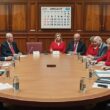The debate surrounding Germany’s proposed overhaul of its military conscription model is intensifying, with a prominent voice within the ruling Social Democratic Party (SPD) signaling preference for a social service year over the controversial lottery system currently envisioned. SPD parliamentary group leader Matthias Miersch has publicly expressed reservations about resorting to a draft determined by random selection, highlighting a perceived stronger appetite among young Germans for community engagement through alternative means.
Miersch’s comments, delivered to Bavarian media outlets, suggest a strategic shift in the government’s thinking, prioritizing a broader societal discussion regarding a mandatory social year before potentially activating the lottery system – a contingency plan triggered by insufficient volunteer enlistment. He acknowledged the challenging constitutional hurdles associated with formally establishing such a social service program but emphasized the genuine willingness of young people to contribute to society.
The leadership’s current stance pits a potentially popular, though politically complex, social year program against a reformed military conscription system already facing criticism and logistical challenges. Despite acknowledging the difficulties in securing the necessary constitutional amendments for a mandatory social year, Miersch argued that exploring volunteer options should be the primary focus.
The government maintains its optimism regarding volunteer recruitment, pointing to enhanced incentives, including a salary of €2,600 and driver’s license opportunities and a comprehensive information campaign directed at young individuals and their families. Furthermore, the reported rejection of 3,500 volunteers this year due to capacity constraints seemingly indicates a strong underlying interest.
However, critics question whether these incentives and outreach efforts will be enough to offset a decline in volunteer enlistment, particularly given shifting societal priorities and ongoing debates regarding the role of mandatory service in a modern democracy. Miersch’s reservations underscore the fragility of the current plan and raise fundamental questions about the government’s long-term strategy for bolstering Germany’s defense capabilities while navigating the complexities of civic engagement and constitutional restrictions. The push for a social year, even in a nascent stage, might be a deliberate tactic to soften the blow of a potentially unpopular draft lottery system and to gauge the appetite for a broader model of national service.





